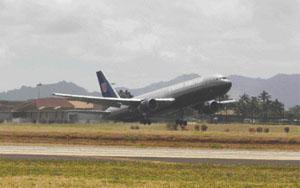The Hawai‘i State Department of Transportation yesterday entered a series of agreements with Hoku Solar Inc. in which the DOT will purchase solar electricity from photovoltaic systems to be installed at airports statewide, according to a joint press release. “This
The Hawai‘i State Department of Transportation yesterday entered a series of agreements with Hoku Solar Inc. in which the DOT will purchase solar electricity from photovoltaic systems to be installed at airports statewide, according to a joint press release.
“This is an exemplary public-private partnership that will bring clean, solar power to many of our state’s public facilities, with minimal up-front investment,” Brennon Morioka, director of the Hawaii State Department of Transportation, said in the release. “Now, more than ever before, the state must seek every opportunity to integrate renewable power and energy conservation into public operations. Power purchase agreements like these not only represent thoughtful stewardship of taxpayer dollars, but they provide important, incremental relief to the very real dangers of global climate change.”
Under the terms of the agreements, the state will not need to lay out for upfront costs of the installation of the PV panels on the rooftops of various state-owned buildings. Hoku Solar will own and operate each system, and sell the energy gleaned from the panels to the state at a predetermined rate for 20 years.
DOT spokeswoman Tammy Mori said that the rates will be different for each island, but that the baseline rate for Kaua‘i upon the system’s late 2008 completion would be 38 cents per kilowatt-hour and would rise just 2 percent per year for the length of the contract.
“It’s a win-win situation because currently PV power is $.03 cheaper per kwh than standard utility rates,” Mori said. “Also, PV is not as subject to rising utility costs and is more stable.”
Mori said that the panels would be installed at four locations at the Lihu‘e Airport: the terminal roof, cargo roof, T-hangar rooftop and baseyard rooftop.
“They’re going to put in voltaic-type solar panels on the roof so that we have the ability to generate our own electricity and become as self-sustaining as possible,” said Tim Skinner, assistant district manager for Lihu‘e Airport. “It’s a unique scenario, a designed build partnership with an outside company.”
Furthermore, the rooftops of the DOT’s Highways Kaua‘i baseyard and Harbors Kaua‘i baseyard will become the only non-airport locations statewide to have the panels installed. The six locations will have an estimated aggregate annual production of 686,923 kwh, Mori said.
That large amount of energy will likely no longer be purchased from the Kaua‘i Island Utility Cooperative, potentially costing KIUC hundreds of thousands of dollars annually.
“It’s a substantial amount of money. … We would be losing some sales, but we wouldn’t be losing all of it,” said Randy Hee, KIUC president and CEO. “I expect the airport will still be operating in the evening, when the sun is down. I’m sure what they’re putting in will not offset all of what they purchase, so they’ll still be connected and we’ll still be selling energy to them.
“If everybody does that, it would be tough. It would change the rate structure to cover the (cost of) infrastructure, with fewer people paying for that infrastrcture. If a large amount of these things happen, it could impact us drastically,” Hee said.
With the Hawai‘i Clean Energy Initiative encouraging energy efficiency and independence, similar issues are only going to become more and more common in the future, Hee explained.
“It does affect our revenue stream, but we can’t readily discourage it,” Hee said. “To some extent we encourage these installations, because it does reduce our overall oil dependence.”
• Michael Levine, staff writer, can be reached at 245-3681 (ext. 252) or via e-mail at mlevine@kauaipubco.com


